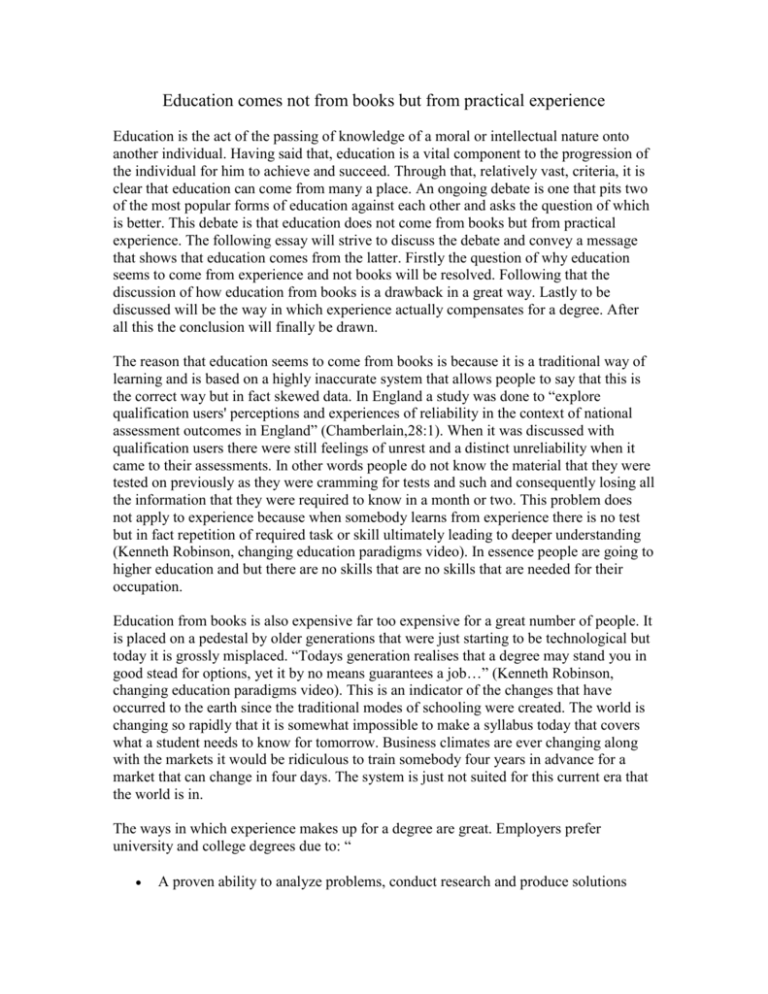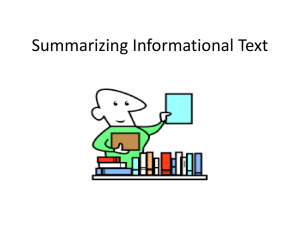Education comes not from books but from practical experience
advertisement

Education comes not from books but from practical experience Education is the act of the passing of knowledge of a moral or intellectual nature onto another individual. Having said that, education is a vital component to the progression of the individual for him to achieve and succeed. Through that, relatively vast, criteria, it is clear that education can come from many a place. An ongoing debate is one that pits two of the most popular forms of education against each other and asks the question of which is better. This debate is that education does not come from books but from practical experience. The following essay will strive to discuss the debate and convey a message that shows that education comes from the latter. Firstly the question of why education seems to come from experience and not books will be resolved. Following that the discussion of how education from books is a drawback in a great way. Lastly to be discussed will be the way in which experience actually compensates for a degree. After all this the conclusion will finally be drawn. The reason that education seems to come from books is because it is a traditional way of learning and is based on a highly inaccurate system that allows people to say that this is the correct way but in fact skewed data. In England a study was done to “explore qualification users' perceptions and experiences of reliability in the context of national assessment outcomes in England” (Chamberlain,28:1). When it was discussed with qualification users there were still feelings of unrest and a distinct unreliability when it came to their assessments. In other words people do not know the material that they were tested on previously as they were cramming for tests and such and consequently losing all the information that they were required to know in a month or two. This problem does not apply to experience because when somebody learns from experience there is no test but in fact repetition of required task or skill ultimately leading to deeper understanding (Kenneth Robinson, changing education paradigms video). In essence people are going to higher education and but there are no skills that are no skills that are needed for their occupation. Education from books is also expensive far too expensive for a great number of people. It is placed on a pedestal by older generations that were just starting to be technological but today it is grossly misplaced. “Todays generation realises that a degree may stand you in good stead for options, yet it by no means guarantees a job…” (Kenneth Robinson, changing education paradigms video). This is an indicator of the changes that have occurred to the earth since the traditional modes of schooling were created. The world is changing so rapidly that it is somewhat impossible to make a syllabus today that covers what a student needs to know for tomorrow. Business climates are ever changing along with the markets it would be ridiculous to train somebody four years in advance for a market that can change in four days. The system is just not suited for this current era that the world is in. The ways in which experience makes up for a degree are great. Employers prefer university and college degrees due to: “ A proven ability to analyze problems, conduct research and produce solutions A proven ability to learn complex, difficult subject matter Proof they are motivated and have drive Proof of intelligence Better interpersonal skills” . (Ha, Education vs Experience: the debate.) When an individual looks at this criteria it may seem better than experience, but surely one can be trained in these stipulations faster in a company if the job requires it. Surely a company would prefer somebody tailored for their particular occupation. John Ha makes a statement that shows that it is not just for the degree that a person is hired but a number of skills and all those skills are dependent on the person. In essence a degree is merely a written form saying that one is probably competent enough to be hired to do work in some fields while experience is a guarantee of ones credibility. In conclusion it is more than fair to regard experience as the giver of education more so than books. It has been shown in the above essay that all the different facets of books merely make for a better appearance to learning but true learning and education is done by specialising in a particular field in a company and receiving training in it.





